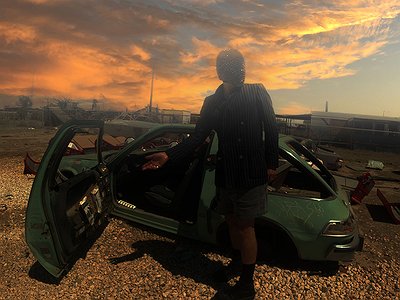Name: Sébastien Chenut aka NEWEM
Nationality: French
Occupation: Producer, DJ
Current release: NEWEM's Siders, featuring remixes by Heidi Höven, Blaacon, Soft Riot and Dave Aju, is out via bORDEL.
Recommendations: Roland Jupiter 6, Polyvox Synth
If you enjoyed this NEWEM interview and would like to stay up to date with Sébastien Chenut and his music, visit him on Instagram for NEWEM and Scratch Massive. For the thoughts of one of his collaborators, read our Curses interview.
What was your first studio like?
The very first studio was a home studio with a Yamaha A3000, a Waldorf pulse, a 707 Roland, a drumstation novation and a mixer 01V.
How and for what reasons has your set-up evolved over the years and what are currently some of the most important pieces of gear for you?
Finding your own tools takes time, you don’t know at the beginning which gear will be your best friend.
I started with an Akai S2000, and I hated it so much I couldn’t make music like I wanted. Then I discovered the Yamaha A3000 and only then did my workflow start to move.
Currently, my go-to pieces are the Roland Jupiter 6, HydraSynth from ASM, Sequential Pro One, SH 101 Roland.
Some see instruments and equipment as far less important than actual creativity, others feel they go hand in hand. What's your take on that?
I think it’s a combo. You do need to trust and know your gear and not be worried when you create.
But you still have to create - the gear doesn’t make the music for you.
A studio can be as minimal as a laptop with headphones and as expansive as a multi-room recording facility. Which studio situation do you personally prefer – and why?
It's not the quantity. Again it’s how you feel comfortable in your workflow that makes your studio a good room for your creativity
From traditional keyboards to microtonal ones, from re-configured instruments (like drums or guitars) to customised devices, what are your preferred controllers and interfaces? What role does the tactile element play in your production process?
I love the Arturia Sequencers. They do the job for me out of all my vintage gear, including midi plugs ins.
I don’t have any customized instruments.
In the light of picking your tools, how would you describe your views on topics like originality and innovation versus perfection and timelessness in music? Are you interested in a “music of the future” or “continuing a tradition”?
Music is hard to make, so I m not thinking like this. I’m more like, “if it works in this direction, I will follow this path”. You have to grab it and keep it when it comes to music or art.
Electronic music is and will always be the music of the future. :)
Within a digital working environment, it is possible to compile huge archives of ideas for later use. Tell me a bit about your strategies of building such an archive and how you put these ideas and sketches to use.
I don’t really do archive processing. Either, I'll go start to finish, or I start and put it directly in the trash box if I don’t like it. I hate having folders with pieces of music, or loops in and collecting all those folders for nothing.
How do you retain an element of surprise for your own work – are there technologies which are particularly useful in this regard?
The sound I develop is often partly due to accidents. Especially with analog gear, you find yourself in the middle of something you didn’t want to happen, but you keep it as a new direction. It is very exciting.
Of course, there are sessions, especially when scoring soundtracks, where you have to have better discipline, because it's a long process of creation, and you have to be able to recall certain sounds to correct them or adjust them in post-production.
With analog gear you can’t do that, it’s too complicated to recreate as identical if you need to correct something. So, I’m more into plug-in software and digital keyboards for soundtracks, it’s safer.
To some, the advent of AI and 'intelligent' composing tools offers potential for machines to contribute to the creative process. Do you feel as though technology can develop a form of creativity itself? Is there possibly a sense of co-authorship between yourself and your tools?
I love AI for post-production, mixing and mastering, it is a very good partner for an artist nowadays.
Talking about the co-authorship, I had an experience recently with an inconvenient situation where I used a preset from a software synth. The copyright of it is available to anyone who buys the software license, but when you upload your song to Soundcloud for example, it says to you that someone else owns your track because it has this preset in it.
By checking, you realise that it is a guy who has 14 followers who uploaded a song with this preset and that now becomes the owner of it for the world. A complicated situation that will happen more and more.
What tools/instruments do you feel could have a deeper impact on creativity but need to still be invented or developed?
I don’t know, I’m good with what I have ...




